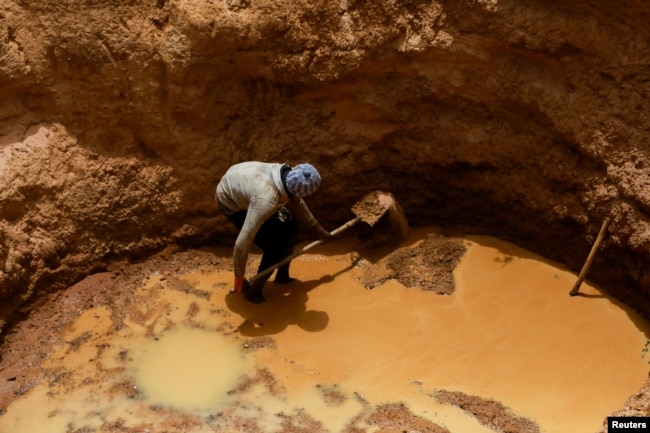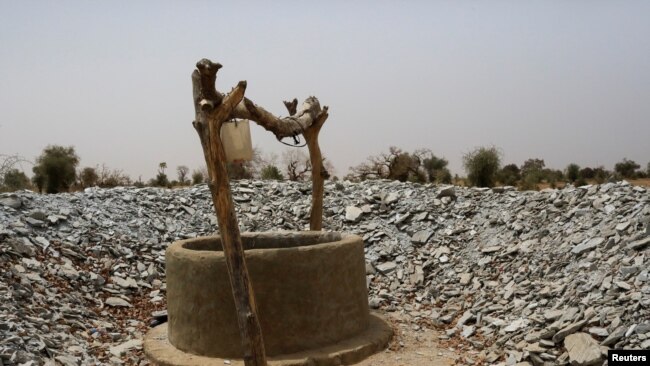アフリカ、地下水に立ちはだかる難しさ
recent
アフリカの人々が地下水を手に入れるのを阻むコストと難しさ (和訳)
Cost, Difficulty Prevent Africans from Getting to Underground Water
April 11,2022
サハラ砂漠以南のアフリカ諸国における水不足に対して、地下水が解決策となることを示唆する最新の研究結果が発表されました。
この発見は、気候変動の影響を強く受けると予想される地域の何百万人もの人々を助ける可能性があります。
この研究は、国際的な非営利団体であるウォーターエイドと、英国の政府機関である英国地質調査所(BGS)が実施したものです。その結果、地下水によってアフリカ諸国が少なくとも5年間は干ばつに対処できる可能性があることがわかりました。
3月に発表された報告書では、地下水がこの地域の農業の発展に役立つ可能性があるとしています。農地の3〜5%しか灌漑されていない地域で、水資源を追加することで農業が発展する可能性があります。
例えば、BGSの情報によると、セネガルには帯水層(地下水供給)があり、長年の降雨により良好な状態が保たれていることが分かっています。しかし、その水を手に入れるのは難しく、コストもかかります。専門家によると、地下水を見つける訓練を受けた科学者を見つけるのは難しいそうです。
セネガル北部の村、タタ・バティリー。2010年に井戸が枯れ始めると、政府は別の井戸を掘りました。その井戸も枯れ始めました。そこで町は5,000ドルを集め、昨年、新しい井戸を掘りました。しかし、その井戸もダメになったのです。
最も信頼できる帯水層は、地下400メートルにも及びます。タタ・バティリーの井戸の10倍の深さです。それだけの深さの井戸を作るには2万ドルほどかかります。
「私たちは喉の渇きを満たすために十分な量を飲むことができない。」とウムー・ドラメさんは言っています。また、自分たちの体も服も洗わないと言います。彼女は40歳で、5人の母親です。毎日、日の出前に起きて、数時間後に涸れる前に古い井戸から残っている水を汲んでいます。
「夜も眠れず、子どもたちを家に残して水を汲みに行くんです。朝早くから今までずっと水を探しています。」と、ドレームさんは井戸からほとんど空になった水筒を運び上げた後、言いました。
水を探す
タタ・バティリーのあるマタムという暑くて乾燥した地域では、使えなくなった井戸がよく見られます。気温は50℃に達することもあります。その地域の人々は、どこに井戸を掘ればいいのか推測します。間違うと、女性や子どもたちは数リットルの水を求めてさらに遠くまで行かなければなりません。
ロイターが訪れた村では、人口増加と予測不可能な降雨のために供給が減少していると、地元の人たちが話していました。
アラン・マクドナルド氏は、「セネガルで言えることは、良質の地下水が必ずしも希望する場所にあるとは限らないということです。」と語ります。彼はBGSで水資源を研究している科学者です。
3月にセネガルの首都ダカールで開催された世界水会議では、国際的な水の専門家や指導者が集まりました。彼らは、水道網が届かないところに住む人々のために、飲料水の供給を改善するよう呼びかけました。
同じ週、700kmほど離れた北東部のタタ・バティリーでは、村から数km離れた乾いた川底を地元の人々が掘り返していました。そこにある汚れた水を集めていたのです。
子供たちは気分が悪くなっても、すぐにその水を飲んでいました。
Cost, Difficulty Prevent Africans from Getting to Underground Water
A recent study suggests that ground water is an answer to water shortages in African countries south of the Sahara Desert.
This finding could help millions of people in an area which is expected to be strongly affected by climate change.
WaterAid, an international non-profit group, and the British Geological Survey (BGS), a British government organization, carried out the research. It found that underground water could help African countries deal with at least five years of drought.
The report released in March said underground water could help develop agriculture in the area. Additional water resources could help farming in an area where only three to five percent of agricultural land is irrigated.
For example, BGS information shows Senegal has an aquifer, or underground water supply, that has been kept in good condition by years of rainfall. But getting to the water is difficult and costly. Experts say it is hard to find scientists who are trained at finding underground water.
Tata Bathily is a village in northern Senegal. When a well there began to dry up in 2010, the government dug another one. That well began to dry up too. Then the town raised $5,000 to dig a new well last year. But that well also failed.
The most dependable aquifers can be 400 meters underground. That is 10 times deeper than the Tata Bathily wells. Building a well that deep costs about $20,000.
"We don't drink enough to satisfy our thirst,” said Oumou Drame. She added that they do not wash themselves or their clothes. She is 40-years-old and a mother of five. She wakes up before the sun rises every day to get what is left from the old well before it runs dry in a few hours.
"We don't sleep at night, we leave our children [at home] to fetch water. From very early in the morning until now we are looking for water," said Drame, after transporting up a near-empty water can from the well.
Finding water
Wells that no longer work are common in the hot and dry area called Matam where Tata Bathily is found. Temperatures can reach 50 degrees Celsius. Communities there guess where to dig a well. When they are wrong, women and children have to go even farther in search of a few liters of water.
In villages visited by Reuters, local people said that the growing population and unpredictable rainfall have reduced supplies.
"The story for Senegal is that the good quality groundwater may not be exactly where you want it to be," said Alan MacDonald. He is a scientist who studies water resources at the BGS.
International water experts and leaders gathered in Senegal’s capital Dakar in March for a meeting of the World Water Council. They called for better availability of drinking water for those who live beyond the reach of piped water networks.
That same week, local people in Tata Bathily, about 700 kilometers away in the northeast, were digging in a dry river bed a few kilometers from the village. They were collecting the dirty water that was available there.
Children quickly drank it, even though it made them sick.
Words in This Story
drought – n. a long period of time during which there is very little or no rain
irrigate – n. to supply (something, such as land) with water by using artificial means (such as pipes)
thirst – n. a feeling or need to drink water or some other drink
fetch – v. to go after and bring back (someone or something)
guess – v. to form an opinion or give an answer about something when you do not know much or anything about it

